Monday 20th January is called Blue Monday and thought of as the saddest day of the year. But no matter what day it is there is always hope.
Northern Ireland Chest Heart & Stroke (NICHS) gives hope to and supports thousands of people in Northern Ireland living with a chest, heart or stroke illness This support takes place both in hospitals after their diagnosis and whilst receiving acute care, through to in their homes with their family and communities once they have been discharged.
Whilst in hospital though it can seem like life has changed forever and that there is little hope. NICHS want to give hope to everyone in hospital that has had a stroke illness to show that recovery is possible and there is hope after having a stroke.
In 2023 the charity created their Halls of Hope in hospital stroke wards across Northern Ireland. The halls of hope provide patients and their family members with information about the charity and the services it offers to help stroke survivors with their recovery after they leave hospital.
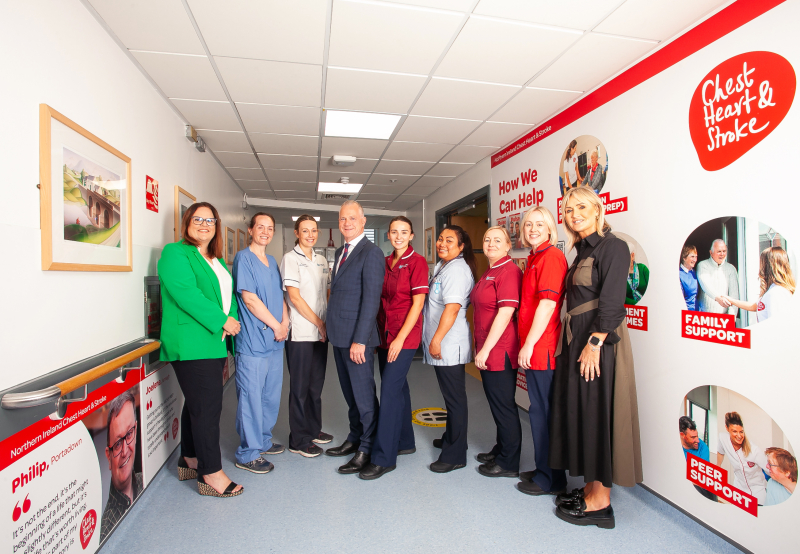
Ursula Ferguson, NICHS Head of Care Services (Far left), NICHS CEO Declan Cunnane (4th from left) and Noelene Hughes, NICHS Head of Stroke Services (far right) with staff from the stroke ward at Royal Victoria Hospital, Belfast, alongside the charity's 'Hall of Hope' on the ward.
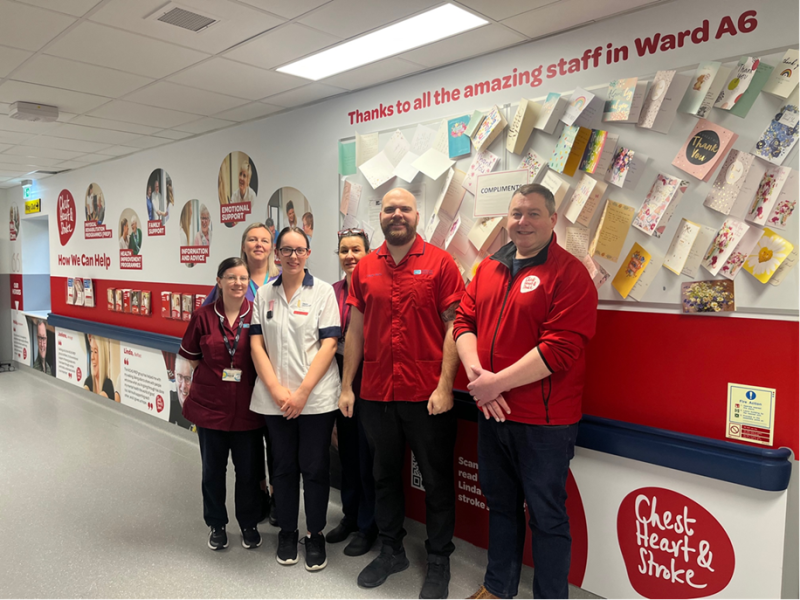
Staff from the stroke ward in Antrim Area Hospital with one of the NICHS information walls.
It also features Hope Heroes, people who are previous stroke survivors and NICHS Care service users, who are willing to share how the charity helped them on their post-stroke recovery journey. The charity hopes these stories will help inform, inspire, and encourage stroke patients and their families as they face difficult times and to show that there is hope after having a stroke.
Here are some of the inspirational stories of hope and recovery from some of the NICHS Hope Heroes.
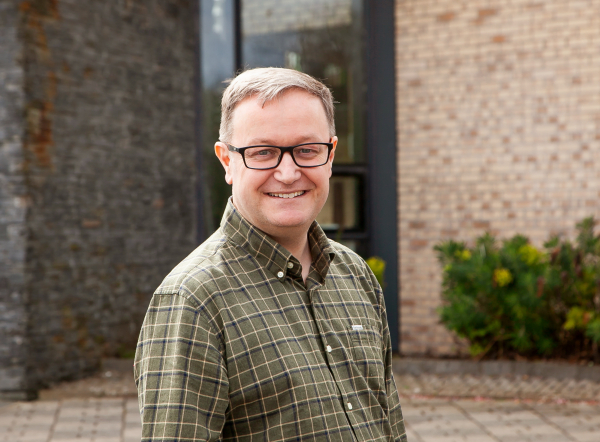
Philip
Philip Annett, 50 from Portadown, was in the middle of a short career break which often saw him travelling across the world to destinations including the Philippines and South Korea, when he had a sudden stroke on the 22nd of October 2022.
Philip recalls, “My 16-year-old son Ethan and I were in Lisburn building a fence at my mother in law’s house. After lunch, I didn’t feel well. I felt like I had a dizzy head, although it wasn’t a normal dizziness. I thought it would get better, but it didn’t go away.”
“Ethan was asking me, ‘Are you okay?' butI couldn’t reply to him because my speech had gone. Thankfully, Ethan knew straight away it was a stroke and got me inside the house and phoned for an ambulance. He was told it would take 2 hours and it would be quicker to get me in a car if possible, so my wife Denise helped me into the car and drove to Craigavon.”
“They scanned me and found out I had a clot on my brain caused by a dissection in the left carotid artery. I received the clot busting drug Thrombolysis and was then blue lighted to the Royal Victoria Hospital in Belfast where the team were waiting to bring me into surgery. There were several people in that team, nurses and surgeons, who came in late on a Saturday afternoon when they weren’t on duty. It’s amazing that those people, who didn’t know me, came in of their own free will to treat me. I had a Thrombectomy which saved my life.”
“As I was wheeled back towards the recovery ward, I put my thumbs up to my wife and was trying to speak to her which was amazing as just before the surgery I had no comprehension and couldn’t communicate at all. Now I was starting to speak and understand again.”
By the Monday, Philip was walking around with physios and was discharged back to Craigavon Area Hospital. He started speech therapy and was classed as having moderate to severe aphasia and dysphasia. Aphasia is when a person has difficulty with their language or speech, and dysphasia is an impaired ability to understand or use the spoken word.
Philip says, “My mobility was okay at that stage, my speech was the main problem. I could say words when looking at a picture, like dog or cat. I also had to work on my writing and reading – even now, I would still struggle a bit with reading a book. I was then transferred to Loane House in Dungannon and received speech therapy 3 or 4 times that week. When I was discharged the speech therapists continued to visit me at home. My speech got better then really quickly.”
“I would say the hardest part of my struggle was actually from then on. You would think everything was back to normal - my speech and mobility were okay - but I was out of routine, not working and I didn’t know what to do with myself. Anxiety played a big part and still does, although I’m getting a lot better. After you’ve had a stroke, when you have any little pain or twitch, you think, is this another stroke? It was the lack of confidence that really affected me.”
“The NICHS Post Rehab Exercise Programme (PREP) really helped. When I first went, I was like a rabbit in the headlights. I was thinking, if I do too much will I have another stroke? Having that reassurance from Zoe and Rita from NICHS was the key thing. They gave you that gentle push along or the tough love with a smile on their face when you needed it.”
“It gave you a reason to get out of bed in the morning. You were meeting people who have been through the same thing and are in the same boat. The follow up on a personal level was so important – to have people that were interested in you, in where you were at, the level of progress you were making, and where you could get to was so important. The NICHS team are bright, positive and willing to listen.”
Philip does not want to let his stroke define him. He says, “My stroke is part of my story and always will be, but my story is not over. I don’t want to be identified as a ‘stroke survivor’ or someone to feel sorry for – I’m just Philip. Everybody goes through difficult things in their lives. It’s important to talk about it openly, but you have to try and build back what was normal too, the things that you enjoy, and then move forward.”
“It’s not the end, it’s the beginning of a life that might be slightly different, but it’s still a life that’s worth living.”
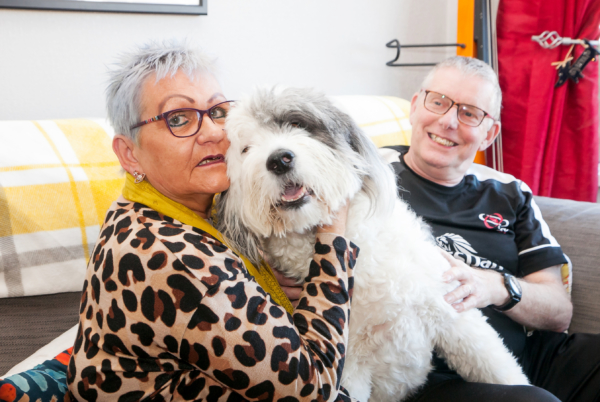
Linda
Linda, from Belfast, had a life-changing stroke almost 5 years ago when she was 62. Linda explains, “The day I had my stroke was a perfectly normal Sunday. I started to feel a bit dizzy, so I went and lay down upstairs. When I woke up, I needed the bathroom, but I couldn’t get up. I was paralysed on my left side. I banged on the floor to alert my husband Allen, and when he came up, he knew straight away I was having a stroke.”
“I was rushed to the Royal Victoria Hospital, and there it was confirmed I’d had an ischaemic stroke, which means there was a blockage in one of the arteries in my brain.”
After her stroke, Linda felt like her whole world had come to an end. Linda says, “I was devastated and felt that I wasn’t me anymore and frustrated that I couldn’t do the things I used to do. I had to relearn to walk. When I first came home from hospital, I couldn’t do anything with my left hand.”
Linda started working with Northern Ireland Chest Heart & Stroke and has nothing but praise for the charity. She says, “I feel so blessed that NICHS came into my life. I attended their PREP programme. It lasted for 6 weeks and I enjoyed it so much, I went back for another 6 weeks. Each week we’d do exercises with a physio and each week I was finding I could do the exercises for longer. It really helped with my physical recovery.”
One of the biggest benefits of PREP for both Linda and her husband Allen was the emotional support which helped the couple understand Linda’s stroke and its full impact. Linda explains, “At PREP, we learnt about different aspects of stroke and how to manage it. When I was finding it hard to control my emotions and taking them out on my family, Allen used to take it personally, but from going to the class, we both learned it’s because of my brain being affected by the stroke.”
“Being able to go along and share with people who know what you’re going through has done my mental health the world of good too. We’re all supporting each other, and it gives us hope.”
“My stroke was almost 5 years ago, and life has changed for the better. Allen and I now volunteer each week at PREP, and at an NICHS Young Stroke Group. I’m so happy to be able to give back to others like me who are starting their stroke journey.”
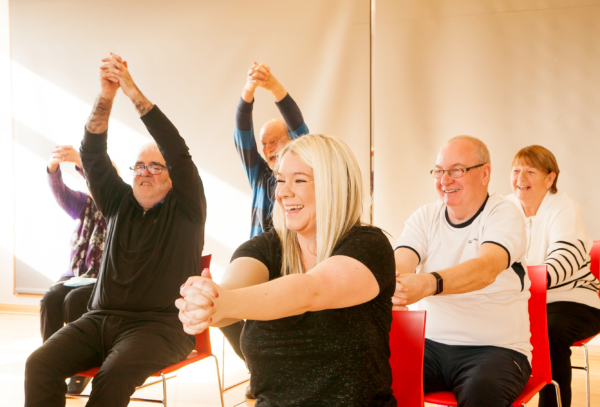
Jolene
“I was working away, a mum, perfectly healthy, and then boom - a stroke out of the blue.”
Jolene McAdam from Armagh was an ordinary, busy mum to three kids under seven when life as she knew it was turned upside down by a sudden stroke, aged just 34.
“I’ll never forget that day,” Jolene recalls, “It was 26th of May 2021. I was in the car travelling home from Portrush when I began to feel very sick and started vomiting. I thought nothing of it at first, but then all of a sudden, I saw a big white flash, like a camera going off, and I couldn’t see.”
“I thought it would pass in a minute because I would have been prone to visual migraines, but after a few minutes it didn’t go away, and I started to really panic. We pulled up to the nearest doctors and when the doctor came out to the car, I could only see half of her.”
“The doctor said I could be having a type of migraine that mimics a stroke, or it could be a full-blown stroke. She advised me to go to hospital, so we called an ambulance.”
Once the ambulance arrived, it became even more apparent something was very wrong with Jolene. “When the paramedics came they had to put me on a stretcher because I couldn’t walk. By this stage, I couldn’t move my whole right side. I started finding it difficult to communicate. In the ambulance, the paramedic was asking me questions and it came to a stage where I just shook my head at him. I couldn’t even think or understand. I remember him asking me my name and I told him my maiden name - I knew that wasn’t right, but I couldn’t remember what my name was.”
Jolene was brought to Antrim Hospital and began tests to find out what was wrong. “The doctors were assessing me, showing me pictures and seeing how much I could see. At this point my whole right side was completely gone. I remember looking down the bed and my arm was just hanging off the bed and I couldn’t move it. I couldn’t communicate - they were talking to me and all I could do was either nod or shake my head.”
“I was thinking, if this is a visual migraine this is horrendous and felt a bit embarrassed that I was in such a bad way. But then I was taken into another ward and I remember this woman coming up to me and saying ‘Jolene, you’ve had a stroke’. I just felt like her face, everything, just zoned out. It was a total shock.”
Jolene says, “It was difficult being looked after in hospital and losing my independence. I’m a nurse and look after people with disabilities so I would look after people in my job and having the roles reversed is really difficult to deal with.”
“I was terrified thinking I was going to be left not being able to do things for myself. I am so glad that I have progressed, and I am starting to do more for myself.”
“It took me a long time to accept what had happened. For me it was the wee things you lost independence in. I remember being asked if I wanted a bib to eat because I was spilling my food, and I thought, ‘No, I don’t want one, I don’t need one!’ I was determined, and I wouldn’t accept that I had lost my independence - I was always pushing saying ‘I can do this myself’. I really wanted my independence back.”
When she was discharged from hospital, Jolene returned to a very different life than the one she had left behind that day. “It affected everything,” she says, “There’s not an area of my life that it didn’t affect. Being able to do things for myself, getting out and about, socialising. At the start, I couldn’t even have a conversation with anyone. When I came home, I could only see half the TV screen and I would have to turn my whole head to watch it. I couldn’t even tolerate the noise of the TV.”
“Everything was exhausting. I needed help with everything - cooking, cleaning, looking after the kids. My youngest, Kaiden, was only one and a half and I couldn’t change his nappy, I couldn’t even lift him to carry him or bath him.”
“Back then, after getting up and getting dressed, I was ready for bed again. Looking back now, I’ve come a long way from that.”
“It’s also very frustrating because people don’t understand, they think that as lots of time has passed that I must be better, and to look at me I look fine. You can’t see the difficulties beneath the surface.”
Jolene was first contacted by Northern Ireland Chest Heart & Stroke’s Stroke Team during the pandemic and took part in their online PREP group. As COVID-19 restrictions eased, Jolene was invited to come along to one of the first PREP programmes in Lurgan as it returned to face-to-face delivery.
Jolene says, “Getting out to the group was brilliant - otherwise my life would have just consisted of being in the house, looking after the kids. It’s really hard to get out and about and socialise since my stroke. I live in a rural area, plus with my fatigue, I’m not able to do a lot of things. For example, if my friends are meeting up to go to the gym, I’m not fit to do that like I used to. With the group, it’s the emotional support of having people who have been through it and totally understand which is so important.
As a young woman as well as a mum, the concerns of everyday life completely changed for Jolene. She says, “When someone suggested going somewhere before my stroke, your worries would have been, have I got something to wear? I wonder am I off work? Now I think, can I go there, would I be fit to do that? Would I have enough energy, would I have to walk far? How will I get my hair done, my makeup done? I can’t do those things the way I used to. For someone like me who is young, you want to be able to go out and feel nice. Even shopping for an outfit is a total chore – I need a seat in a dressing room because my balance isn’t great, and even the energy to walk around the shops- I’m just not fit for it. Before, I would have been the type of girl to jump in the car and go up to Belfast shopping, I would have been queuing in Primark! But all that has changed.”
However, with the support of the PREP group, Jolene is determined to keep recovering. “I hate saying life is hard, because that’s so negative. Life has changed, but it’s about looking at the things I can do.”
Ursula Ferguson, Director of Care Services, commented “We are so thankful to the Royal Victoria, Antrim, Altnagelvin, Craigavon, Causeway, Whiteabbey and Ulster Hospitals who are so supportive to us and allowed us to install our halls of hope in their stroke wards over the last few years”.
“We know through feedback from the stroke survivors who attend our care programmes that they have seen our halls of hope and it has given them hope and information during a very challenging and scary time. We’re also very grateful to our Hope Heros who share their stroke and recovery stories to give hope to others.
To find out more about Northern Ireland Chest Heart and Stroke’s work and the support they offer, or to make a referral to get support, visit www.nichs.org.uk.
